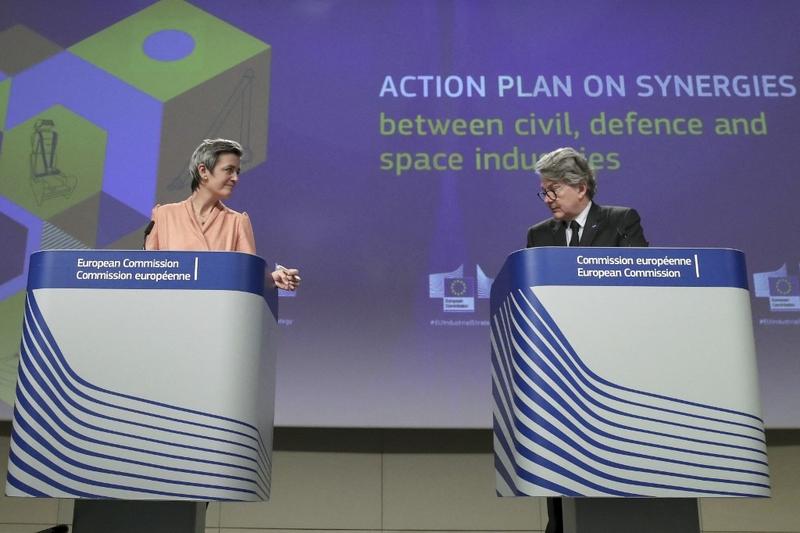 Executive Vice President of the European Commission for an Europe Fit for the Digital Age Margrethe Vestager (left) and EU Commissioner for Internal Market Thierry Breton present the EU's action plan on synergies between civil, defense and space industries, during a press conference in Brussels on February 22, 2021. (YVES HERMAN / POOL / AFP)
Executive Vice President of the European Commission for an Europe Fit for the Digital Age Margrethe Vestager (left) and EU Commissioner for Internal Market Thierry Breton present the EU's action plan on synergies between civil, defense and space industries, during a press conference in Brussels on February 22, 2021. (YVES HERMAN / POOL / AFP)
BRUSSELS - The European Commission on Monday announced three flagship projects - in drone technologies, space communication and space traffic management - aimed at giving the 27-country bloc a competitive edge in these new fields.
Called the Action Plan on Synergies between the civil, defence and space industries, the scheme’s objective is to harness research and innovation in the three sectors for the projects and other ventures.
Called the Action Plan on Synergies between the civil, defence and space industries, the scheme’s objective is to harness research and innovation in the three sectors for the projects and other ventures
ALSO READ: EU to initiate launcher alliance to enhance space autonomy
The EU executive said the drone project would reinforce the competitiveness of EU industry in this key area with a strong defense dimension, while space communication would provide for a resilient and high-speed connectivity in Europe based on quantum encryption.
It said space traffic management was required to avoid collisions resulting from the proliferation of satellites and space debris, while ensuring autonomous EU access to space.
“The idea is for innovations to systematically reach multiple uses by design. And to allow tapping into the huge innovation potential of researchers and start-ups,” European digital chief Margrethe Vestager said in a statement.
READ MORE: China, EU on path of expanding cooperation in outer space
EU industry commissioner Thierry Breton said the projects would help the bloc stand on its own feet instead of relying on other countries.
“It will also reduce our dependencies in critical technologies and boost the industrial leadership we need to recover from the (coronavirus pandemic) crisis,” he said.


